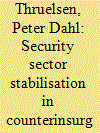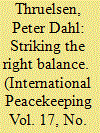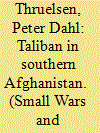| Srl | Item |
| 1 |
ID:
107900


|
|
|
|
|
| Publication |
2011.
|
| Summary/Abstract |
This article argues that the debate on security sector reform (SSR) needs to be taken further by taking into consideration the fact that, even though the SSR concept was not originally developed as an element in stabilising states undergoing an insurgency, it is very much being used for exactly that. When conducting counterinsurgency with a focus on the creation of stability, the baseline will ultimately have to be security sector stabilisation (SSS) as a precondition for complete SSR implementation. However, the two must be connected to avoid them undermining each other. This is important if a comprehensive approach to programme implementation and especially sustainability is to guide the programme, and not just isolated 'train and equip' stand-alone projects that do not solve either the initial need for stabilisation or the long-term need for accountable security forces. Currently, in Afghanistan the surge for security by the international military is in danger of overtaking the other elements of the SSR, thereby undermining the primary end state and thus risking laying the wrong foundation for the long-term process of SSR.
|
|
|
|
|
|
|
|
|
|
|
|
|
|
|
|
| 2 |
ID:
093887


|
|
|
|
|
| Publication |
2010.
|
| Summary/Abstract |
A well-trained, professional police force dedicated to upholding the rule of law and trusted by the population is essential to fighting the insurgency in Afghanistan and creating stability. However, the police programmes in Afghanistan have often been dominated by different national agendas and hampered by too few resources and lack of strategic guidance. These issues pose an enormous challenge for the Afghan government and the international community in rebuilding the police. This article argues that it is imperative that the international effort strike a balance between the short-term needs of fighting an insurgency and the long-term needs of establishing an effective sustainable policing capability when building up the police force - and that the process must not be subject merely to satisfying current security challenges or traditional state-building needs.
|
|
|
|
|
|
|
|
|
|
|
|
|
|
|
|
| 3 |
ID:
096698


|
|
|
|
|
| Publication |
2010.
|
| Summary/Abstract |
This article gives an in-depth description and analysis of the Taliban insurgency in southern Afghanistan in 2008. It describes the local dynamics of the insurgency and argues that the Taliban should not be seen as a unified hierarchical actor that can be dealt with as part of a generic approach covering the whole of Afghanistan. The article will show that the insurgency in southern Afghanistan is highly localised in nature, being to a large extent driven by local commanders and local area networks often centred on individual commanders themselves. It will also show that the driver or cause behind the insurgency differ for the local Afghan Taliban and the foreign Pakistani Taliban respectively. The nature of the southern insurgency, with the local Taliban commanders working through local knowledge networks with a locally determined cause, implies that a strategic-level 'peace deal' with Tier I of the strategic Taliban leadership will not create the desired effect of ending the insurgency - there will not be an overall domino effect in these parts of the country.
|
|
|
|
|
|
|
|
|
|
|
|
|
|
|
|